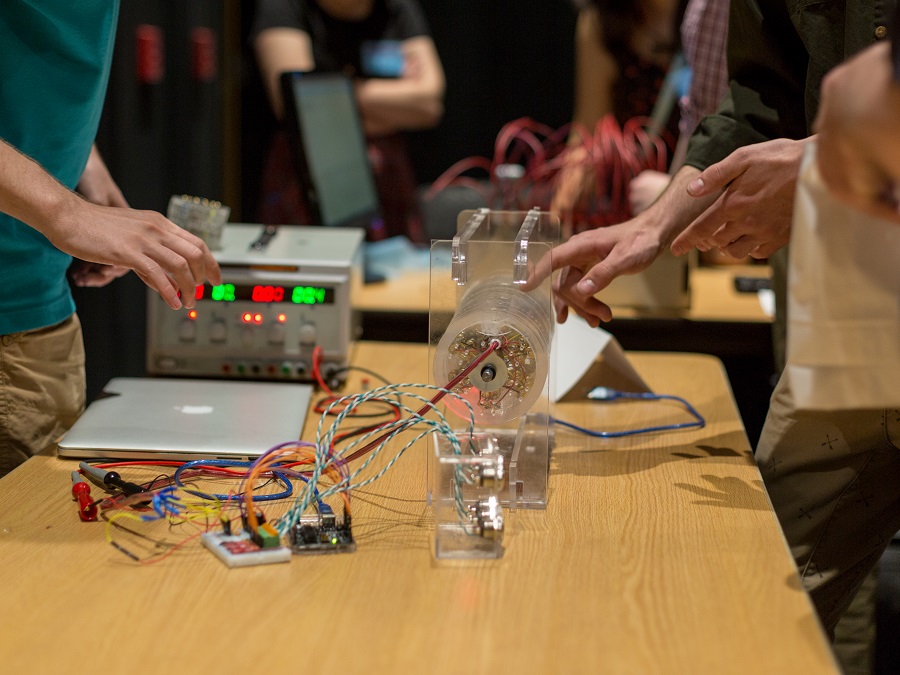
IDeATe Professors Underscore Benefits of Documentation in Creative Practice
By Kathryn Reilly
Note from our student reporter, Kathryn Reilly: I wrote this article prior to Carnegie Mellon’s response to COVID-19, moving to remote learning for the remainder of the Spring 2020 semester. The decision has drastically changed professors’ course plans as well as increased the need for students’ comprehensive project documentation. In this article, I focus on IDeATe professors’ typical documentation practices.
These unprecedented circumstances provide a unique opportunity to investigate how documentation shapes virtual learning. In a follow-up investigation, I will report on the same professors’ responses to conducting their courses remotely. I will also check in with students in IDeATe courses who must document and communicate with their group members virtually.
Often overlooked during the ideation and making process, documentation is a critical piece of project-based learning. Documentation can take many forms but is generally regarded as information that serves as a record of some process, experience or artifact. This record can serve practical purposes of passing on knowledge or even inspires a creative practice in reflection.
IDeATe professors Marti Louw, Thomas Corbett and Robert Zacharias each bring documentation to the forefront of their classes. Their project-based courses, which involve high levels of collaboration and skill development, necessitate good documentation in order to communicate and learn efficiently. Each has a vast experience with documentation both in music and video but also in text and code markdown.
Marti Louw, director of the HCII Learning Media Design Center and Assistant dean of IDeATe, has been conducting an NSF funded research project which explores the use of documentation in learning processes. Louw is also an IDeATe professor of Learning in Museums, a project-based inquiry course which brings students together across the disciplines to consider the design of mediated learning experiences.
Louw, formerly a documentary film producer with practice in documenting with film, and written word, researches the role of documentation in the creative practice. “The way we achieve some sort of reflective practice is to impose systematicity into this flow of creative processes in the form of documenting or timestamps to be able to reflect on,” said Louw.
Louw’s class exposes students to a variety of design research methods exploring the cognitive, social and affective dimensions of learning in everyday contexts. While much of their readings, invited lectures, in-class activities and assignments are structured, Louw allows students flexibility in their documentation to learn from one another. She said, “how you collect your inspirations, how you squirrel them away and how you use them for inspiration is really personal. So, I don't dictate how it's done, but I'd like people to do it.”
In collaboration with the Carnegie Museum of Art, the students learn from a group project with real stakeholders. Documentation plays a major role throughout the entire course and ultimately the final project. “I think a lot of effective collaboration requires some form of group think to be visually manifested or made,” said Louw.
Documentation plays a major role in IDeATe’s Advanced Game Design studio with professor Tom Corbett. This year Tom’s class is developing a virtual reality game based on CMU’s ever anticipated carnival event, Buggy. A group of 22 IDeATe students, broken into groups of designers, programmers, and artists, is set to produce the game during Spring 2020 Carnival weekend.
Because of both the large number of people and short deadline, efficient communication is crucial. Corbett requires each member to post all relevant documents to shared course folders organized by group and week. The game’s producer, Trento von Lindenberg, also contributes weekly posts to the course blog which houses important updates for internal goal setting and external awareness.
Professor Corbett requires that students document their work in order to improve the game functions and preserve the project for future reference. Corbett said, “We are very bad as people at remembering details in our head. Additionally, if you describe something to five different people, if you ask them to recall you're going to get five different versions. Documentation is that key intersection to solidify these ideas between people.”
Professor Robert Zacharias’s course, Introduction to Physical Computing engages all aspects of conceiving, designing and developing projects with physical computing: the application, the artifact, the computer-aided design environment, and the physical prototyping facilities. In each of his projects the students are required to submit documentation according to the course guidelines which makes up 50 percent of the student’s grade.
Because the physical computing lab regularly produces artifacts, Professor Zacharias said, “In the case that they don't document, it will exist only in the memory of the people who saw it.” While he acknowledges that not everything must be documented, it’s important that there is some record that gives proof of work.
Each professor acknowledged that documentation is not as important as a good work ethic, however good documentation can be invaluable as a record for future learning. “What I frequently tell my students is that the problem with documentation is 90 percent of it will not be used. So, most of what you write will not be used, but that other 10 percent is going to be critical. The problem is you don't know which 10 percent, so you just have to do it all,” said Tom Corbett.
Throughout the years, documentation has become an integral component of IDeATe courses. While noting the benefits of good documentation practice, Professor Louw also acknowledged, “I'm sure there have been brilliant people who've never documented a thing and come up with amazing work.” IDeATe courses, which educate students on a variety of documentation practices, ultimately allow students to develop their own documentation habits.